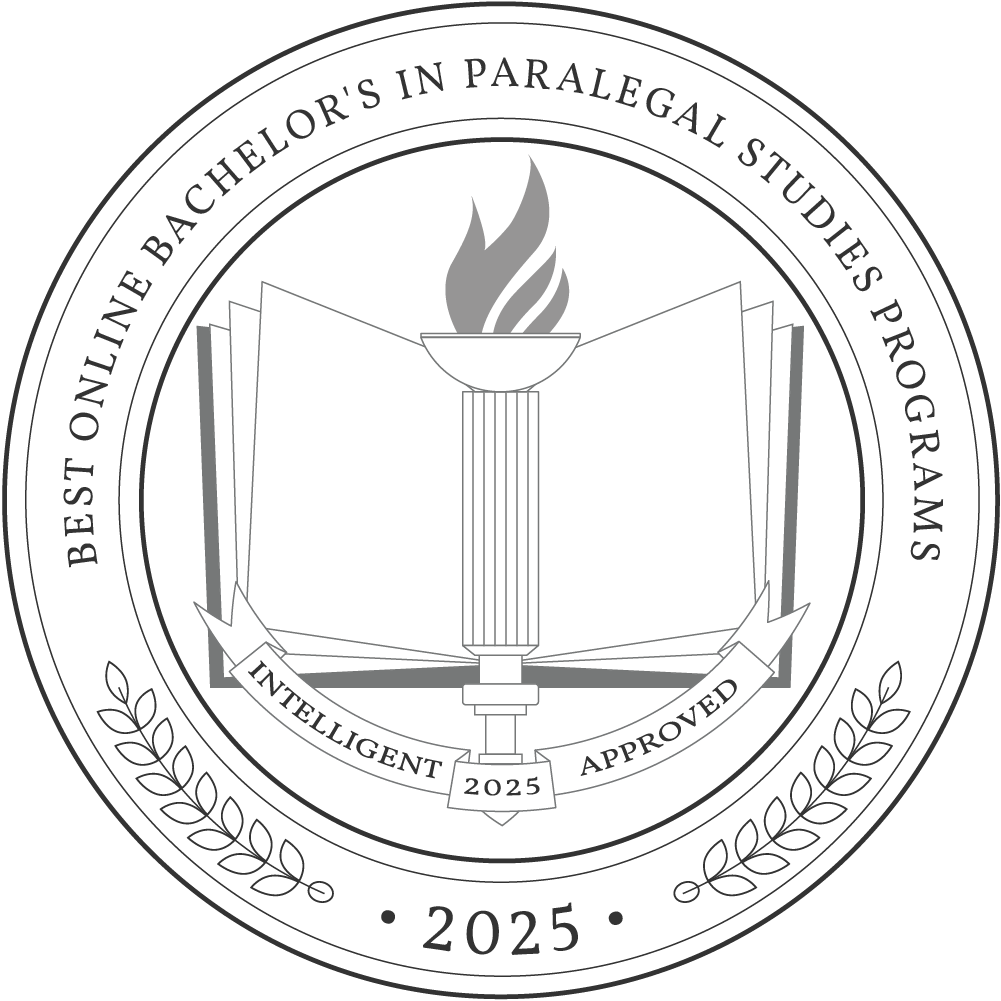A bachelor’s degree in paralegal studies gives students the skills to be invaluable in the legal process by helping prepare lawyers for hearings, trials, and corporate meetings. This degree offers professionals many opportunities to seek positions in the job market and provides a solid educational foundation for those who want to pursue further legal studies.
According to the U.S. Bureau of Labor Statistics, employment for paralegals and legal assistants is expected to increase by 4% through 2032. The median salary for paralegals and legal assistants is $60,970 per year. Graduates can also consider employment as an arbitrator, mediator, or conciliator, earning a median annual salary of $71,540. Projected employment growth for these jobs is 5% through 2032.
The exact cost of an online bachelor’s in paralegal studies will vary by school. The average annual tuition for an undergraduate program is $7,998 at public schools and $34,923 at private schools. An online bachelor’s in paralegal studies usually requires 120 credits and takes four years of full-time study.
Why Trust Us
The Intelligent.com Higher Education Team is dedicated to providing students with independent, equitable school and program rankings and well-researched resources. Our expert-driven articles cover topics related to online colleges and programs, paying for school, and career outlooks. We use data from the U.S. Department of Education’s College Scorecard, the National Center for Education Statistics, and other reputable educational and professional organizations. Our academic advisory team reviews content and verifies accuracy throughout the year for the most current information. Partnerships do not influence rankings or editorial decisions.
- Analyzed over 2,000 national, accredited, and nonprofit colleges and universities
- 800+ rankings pages are reviewed and updated yearly
- Content is informed by reputable sources, surveys, and interviews with academic advisors and other experts
- Over 100 data points are reviewed for accuracy and quality throughout the year, including sources
How we rank schools
Our list features the best online Paralegal Studies degree programs at top colleges nationwide. Each school featured is a nonprofit, accredited institution — either public or private — with a high standard of academic quality for post-secondary institutions.
We evaluated each school’s program on tuition costs, admission, retention and graduation rates, faculty, reputation, and the student resources provided for online students. We collected data from trusted sources like the National Center for Education Statistics, individual school and program websites, school admissions counselors, and other data sources. Then, we calculated the Intelligent Score on a scale of 0 to 100 based on the following criterion:
Academic Quality:
- Admission rate versus enrollment rate
- Retention rate of students who return after year one
- Accreditation status (regional and programmatic)
- Nonprofit status, both private and public institutions
Graduation Rate
- Overall graduation rate
- Total number of currently enrolled students, including diversity metrics
- Student-to-faculty ratio
Cost and ROI
- In-state and out-of-state per-credit tuition rates and fees
- Required credits to graduate
- Earning potential after graduation
- Availability of federal student loans, scholarships, and other financial aid options
Student Resources
- Available student services for online-only and hybrid programs
- On-campus amenities like tutoring centers and the number of libraries
Read more about our ranking methodology.
Best 10 Online Bachelor's in Paralegal Studies Programs
FiltersInstitution Type
Status
- Intelligent Score
- Alphabetically By University Name
- Acceptance Rate
- Enrollment
- In-state Graduate Tuition
- Out-of-state Graduate Tuition
- In-state Undergraduate Tuition
- Out-of-state Undergraduate Tuition

Loyola University Chicago
Intelligent Score: 99.79In-state: $67,818
Out-of-state: $67,818
In-state: $97,480
Out-of-state: $97,480
SAT: 1190-1370
ACT: 27-32
$790
Online, On-Campus
Higher Learning Commission
120

Eastern Kentucky University
Intelligent Score: 99.39In-state: $9,266
Out-of-state: $19,338
In-state: $9,900
Out-of-state: $9,900
SAT: 950-1170
ACT: 19-25
$434
Online
American Bar Association
120

Liberty University
Intelligent Score: 97.94In-state: $14,791
Out-of-state: $14,791
In-state: $7,935
Out-of-state: $7,935
SAT: 1040-1250
ACT: 21-29
$390
Online
Southern Association of Colleges and Schools Commission on Colleges
120

Madonna University
Intelligent Score: 97.77In-state: $24,000
Out-of-state: $24,000
In-state: $16,200
Out-of-state: $16,200
SAT: 920-1110
ACT: 17-24
$540
Online
American Bar Association
120

Hampton University
Intelligent Score: 97.2In-state: $26,198
Out-of-state: $26,198
In-state: $13,099
Out-of-state: $13,099
SAT: N/A
ACT: N/A
$300
Online
Southern Association of Colleges and Schools Commission on Colleges
120

Mississippi College
Intelligent Score: 96.92In-state: $18,200
Out-of-state: $18,200
In-state: $11,610
Out-of-state: $11,610
SAT: 1140-1260
ACT: 21-29
$583 - $875
Online, On-Campus
Southern Association of Colleges and Schools Commission on Colleges
130

Regent University
Intelligent Score: 94.42In-state: $17,220
Out-of-state: $17,220
In-state: $15,552
Out-of-state: $15,552
SAT: 940-1220
ACT: 21-29
$395
Online
Southern Association of Colleges and Schools Commission on Colleges
120

National University
Intelligent Score: 94.3In-state: $13,320
Out-of-state: $13,320
In-state: $15,480
Out-of-state: $15,480
SAT: N/A
ACT: N/A
$370
Online, On-Campus
American Bar Association
120

Peirce College
Intelligent Score: 91.22In-state: $25,034
Out-of-state: $25,034
In-state: NA
Out-of-state: NA
SAT: Not Required
ACT: Not Required
$600
Online, On-Campus
American Bar Association
121

Kent State University
Intelligent Score: 90.31In-state: $10,810
Out-of-state: $19,686
In-state: $11,766
Out-of-state: $11,766
SAT: 1020-1210
ACT: 20-26
$500
Hybrid, On-Campus
American Bar Association
120
How to Choose an Online Bachelor’s in Paralegal Studies Degree Program
Choose your area of study
Students should reflect on their interests and career goals before searching for an online bachelor’s in paralegal studies program. Whether a student plans to go on to an entry-level paralegal job or apply to law school may influence what they look for in a bachelor’s program.
Schools typically offer either a Bachelor of Arts (BA) or a Bachelor of Science (BS) in paralegal studies. A BA will include more general education requirements and have a humanities emphasis. A BS includes more technical and applied coursework. Many programs will also allow you to select a concentration and focus your studies on a particular niche in this field, such as criminal defense, environmental law, real estate, family law, corporate law, immigration, or intellectual property.
Research schools and programs
You should only apply to institutions that have been approved by a DOE-recognized regional accrediting organization, such as the New England Commission of Higher Education or Northwest Commission on Colleges and Universities. These organizations evaluate schools to ensure they provide students with a high-quality education. Those who attend a school that isn’t regionally accredited may be unable to access financial aid or transfer credits to another institution if needed.
Here are some other important questions to get answered during the research phase:
- Are there any experiential learning components, such as internships?
- Who are the faculty members, and what are their qualifications?
- How do online students interact with classmates and faculty?
- What kind of support services does the school provide online students, such as technical support, academic and career advising, tutoring, and counseling?
- Are there networking opportunities available for online students?
To learn more about any schools that you’re interested in, you can visit the school’s website, contact an admissions counselor, follow the school on social media, or attend an in-person or virtual open house.
Prepare for tests and applications
Requirements and procedures typically vary from school to school. An admissions counselor can answer questions or clarify the school’s application process.
For undergraduate degrees, a standard application includes:
- Completed application and required fees
- Official high school transcripts showing proof of graduation or GED
- A resume or CV highlighting jobs, experience, extracurricular activities, and positions of leadership
- Letters of recommendation from teachers, employers, and community leaders acknowledging your achievements and strengths
- Personal essay or statement of purpose
Check with schools regarding their policies for standardized tests like the SAT or ACT. Students should also check if there are specific requirements, such as a minimum high school GPA.
Students with previous college credits should submit their transcripts from other institutions so their new school can evaluate the courses for potential credit transfer.
Select your program
After researching the program’s curriculum, faculty credentials, cost, and reputation, decide if everything accommodates your objectives and needs. You may find that there are only one or two programs to which you want to apply or that multiple programs would be a good fit. There’s no magic number of schools to apply to, but remember that most schools charge application fees. If you’re applying to a high volume of schools, budget accordingly for these fees.
Before making your final decision, review your needs and goals again. Do you plan to attend school full-time or part-time? Do you want your program to be as online as possible, or are you fine with a hybrid program that has a fair amount of in-person requirements? Some programs offer asynchronous courses, which can be completed at your own pace, while others only offer synchronous courses, which involve remotely attending lectures and completing assignments at the same time as other students — which of these two online learning formats do you prefer? Your school should accommodate your scheduling needs and learning preferences.
Determine how you’ll pay for your degree
The first step is to contact the school’s financial aid office and get more information about the program’s total cost and what financial aid options are available.
Most students will want to complete the Free Application for Federal Student Aid (FAFSA), which schools use to determine students’ eligibility for need-based financial aid like student loans, grants, work-study, scholarships, and assistantships. Financial aid counselors can also provide more information about merit-based scholarships and grants the school awards to high-achieving students.
Other options students can explore are employer tuition assistance benefits and payment plans that allow students to pay tuition in installments throughout the term. Veterans or active-duty military members should explore tuition discounts and GI Bill benefits.
What Can You Expect from an Online Bachelor’s in Paralegal Studies Degree Program?
To earn a bachelor’s in paralegal studies, students must complete 120 credit hours. The curriculum comprises core paralegal studies courses, electives, and general education requirements.
Core coursework typically includes litigation, legal research and writing, civil and criminal law, court systems, ethics, and common law practice areas, such as marriage and family law, personal injury, real estate, and contracts.
Students learn how to gather evidence and information on legal precedents and relevant laws, write reports, organize documents, and contact clients for interviews. This program will help develop transferable skills like communication, critical thinking, attention to detail, interpersonal skills, and multitasking.
An internship or other experiential learning component is often part of the curriculum to give students hands-on learning experience.
Potential courses you’ll take in an online bachelor’s in paralegal studies degree program
- Bachelor of Law Practice. This class explores paralegal practice in family law. Students become familiar with documents, forms, and procedures for marriage, divorce, annulment, separation, alimony, custody, community property, and juvenile law.
- Legal Administration and Computer Applications. Learners explore the study of law office administration, including how to use relevant computer applications for law practices.
- Litigation: Evidence to Discovery. This course covers legal principles and paralegal practice in significant civil law. Procedural facets of the early stages of litigation are reviewed.
- Legal Ethics. Students become familiar with the professional responsibilities of lawyers and paralegals. Topics include justice access and the services of the pro bono office.
- Criminal Practice and Procedure. This class introduces students to criminal law and procedure. Students will discuss documents, criminal law forms, and criminal litigation preparation utilizing the systems approach.
What Can I Do With an Online Paralegal Studies Degree?
A degree in paralegal studies provides students with valuable skills and experience that they can apply in the legal field and other industries, including research, critical thinking, attention to detail, and communication.
Graduates of these programs work in various industries, such as legal services, healthcare, government, human resources, and consulting. The most common positions they pursue include legal assistant, compliance officer, legal analyst, and claims adjuster.
A bachelor’s degree in paralegal studies opens the door for most entry and mid-level positions in the field. Students can also continue their education with a degree, such as a master’s in legal studies, to pursue advanced positions.
Career outlook
- Paralegal — Also known as a legal assistant, paralegals support lawyers by conducting research, organizing documents, writing reports, and calling clients.
- Median annual salary: $60,970
- Projected employment growth (through 2032): 4%
- New jobs projected: 38,000
- Arbitrator — Help opposing parties come to a mutual agreement outside of court by facilitating communication, clarifying issues, setting up meetings, and preparing settlement agreements.
- Median annual salary: $71,540
- Projected employment growth (through 2032): 5%
- New jobs projected: 400
- Claims adjuster — These individuals investigate, evaluate, and settle insurance claims to determine if and how much an insurance company must pay.
- Median annual salary: $75,050
- Projected employment growth (through 2032): 3%
- New jobs projected: 21,500
What Can You Do With an Online Bachelor’s in Paralegal Studies?
Career outlook
In addition to working as a paralegal, this degree can also help prepare you for other roles in the legal field. Some of the most common jobs in this industry that require a bachelor’s degree or less education include:
- Paralegal or legal assistant — Assist lawyers by completing tasks such as conducting research, scheduling meetings and interviews, and drafting and filing legal documents.
- Median annual salary: $60,970
- Projected employment growth (through 2032): 4%
- New job openings projected: 38,000 annually
- Arbitrator, mediator, or conciliator — Help opposing parties settle disputes by facilitating communication between parties, interviewing claimants and witnesses, and preparing settlement agreements.
- Median annual salary: $71,540
- Projected employment growth (through 2032): 5%
- New job openings projected: 400 annually
- Court reporter — Assist lawyers and judges by providing word-for-word transcriptions at legal proceedings.
- Median annual salary: $63,940
- Projected employment growth (through 2032): 3%
- New job openings projected: 2,100 annually
Online Bachelor’s in Paralegal Studies Degree Frequently Asked Questions
How do I apply to an online bachelor’s in paralegal studies degree program?
You’ll most likely be able to submit some or all of your application materials online through an application portal on the school’s website. You can also inquire if the schools you’re applying to accept the Common Application, which streamlines the application process.
Official documents like transcripts and test scores usually must be sent directly from the institution or testing agency. Students should request letters of recommendation from teachers, colleagues, or employers who can speak to their relevant skills and achievements. Give yourself sufficient time to prepare your admissions essay or statement of purpose, and have a trusted advisor, teacher, or friend review it before submitting it.
Contact the school’s admissions office if you have questions or need clarification regarding a school’s admissions procedures or deadlines.
How much does an online bachelor’s in paralegal studies degree cost?
This will depend on several factors specific to the school and the student. Contact the school’s financial aid office for the most accurate information about a program’s cost.
The National Center for Education Statistics reports that the average undergraduate tuition is $7,998 per year at public schools and $34,923 per year at private universities. While public schools are often cheaper than private schools, students should note that public institutions may charge out-of-state students more than in-state students.
There are also additional expenses to consider, including school fees for virtual classroom technology, academic resources, and student support services. Students may need to upgrade their computer or internet service so they have reliable technology for their online program.
How long does it take to earn an online bachelor’s in paralegal studies degree?
Generally speaking, a bachelor’s in paralegal studies requires 120 credits and is designed to be completed with four years of full-time study. However, students may take longer if they enroll on a part-time basis.
Students who have an associate degree or certificate in paralegal studies may be able to complete their bachelor’s degree in less time. The school’s admissions office should evaluate these students’ credits to see what will transfer to their bachelor’s program.
Is a paralegal studies degree worth it?
A bachelor’s degree in paralegal studies gives students a broader range of career opportunities and higher earning potential than those without a degree. Most entry and mid-level positions in the legal field require candidates to have a completed bachelor’s degree.
Students with a bachelor’s degree in another field looking to change career paths can gain the necessary experience and skills by obtaining a certificate in paralegal studies. This cost-effective option is ideal for those who don’t wish to complete a full degree.

